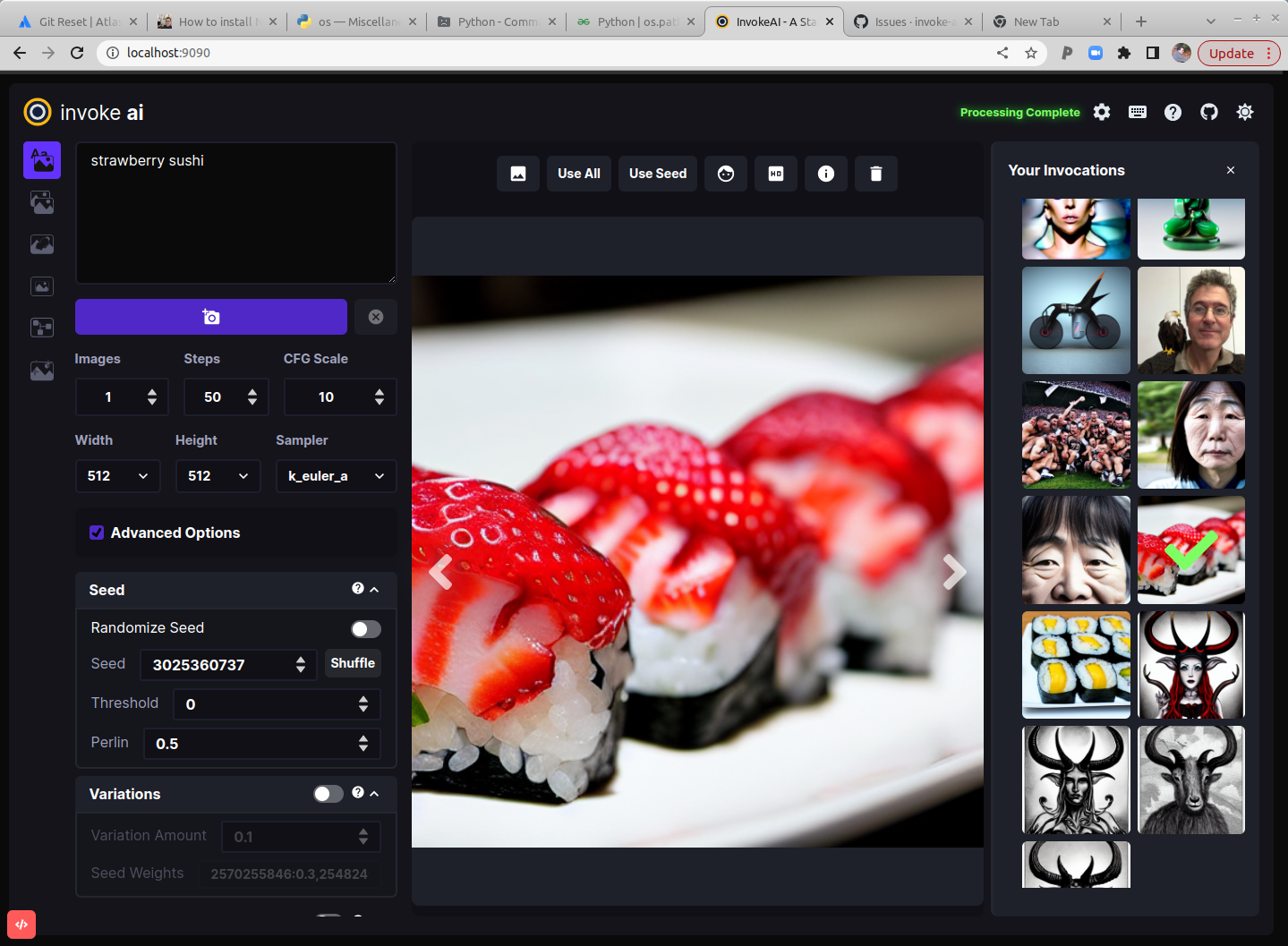10 KiB
| title |
|---|
| Home |
InvokeAI is an implementation of Stable Diffusion, the open source text-to-image and image-to-image generator. It provides a streamlined process with various new features and options to aid the image generation process. It runs on Windows, Mac and Linux machines, and runs on GPU cards with as little as 4 GB or RAM.
Quick links: [Discord Server] [Code and Downloads] [Bug Reports] [Discussion, Ideas & Q&A]
!!! note
This fork is rapidly evolving. Please use the [Issues tab](https://github.com/invoke-ai/InvokeAI/issues) to report bugs and make feature requests. Be sure to use the provided templates. They will help aid diagnose issues faster.
:octicons-package-dependencies-24: Installation
This fork is supported across multiple platforms. You can find individual installation instructions below.
- :fontawesome-brands-linux: Linux
- :fontawesome-brands-windows: Windows
- :fontawesome-brands-apple: Macintosh
:fontawesome-solid-computer: Hardware Requirements
:octicons-cpu-24: System
You wil need one of the following:
- :simple-nvidia: An NVIDIA-based graphics card with 4 GB or more VRAM memory.
- :fontawesome-brands-apple: An Apple computer with an M1 chip.
:fontawesome-solid-memory: Memory
- At least 12 GB Main Memory RAM.
:fontawesome-regular-hard-drive: Disk
- At least 6 GB of free disk space for the machine learning model, Python, and all its dependencies.
!!! note
If you are have a Nvidia 10xx series card (e.g. the 1080ti), please run the invoke script in
full-precision mode as shown below.
Similarly, specify full-precision mode on Apple M1 hardware.
To run in full-precision mode, start `invoke.py` with the `--full_precision` flag:
```bash
(invokeai) ~/InvokeAI$ python scripts/invoke.py --full_precision
```
:octicons-log-16: Latest Changes
v2.0.0 (9 October 2022)
dream.pyscript renamedinvoke.py. Adream.pyscript wrapper remains for backward compatibility.- Completely new WebGUI - launch with
python3 scripts/invoke.py --web - Support for inpainting and outpainting
- img2img runs on all k* samplers
- Support for negative prompts
- Support for CodeFormer face reconstruction
- Support for Textual Inversion on Macintoshes
- Support in both WebGUI and CLI for post-processing of previously-generated images
using facial reconstruction, ESRGAN upscaling, outcropping (similar to DALL-E infinite canvas),
and "embiggen" upscaling. See the
!fixcommand. - New
--hiresoption oninvoke>line allows larger images to be created without duplicating elements, at the cost of some performance. - New
--perlinand--thresholdoptions allow you to add and control variation during image generation (see Thresholding and Perlin Noise Initialization - Extensive metadata now written into PNG files, allowing reliable regeneration of images and tweaking of previous settings.
- Command-line completion in
invoke.pynow works on Windows, Linux and Mac platforms. - Improved command-line completion behavior.
New commands added:
* List command-line history with
!history* Search command-line history with!search* Clear history with!clear - Deprecated
--full_precision/-F. Simply omit it andinvoke.pywill auto configure. To switch away from auto use the new flag like--precision=float32.
v1.14 (11 September 2022)
- Memory optimizations for small-RAM cards. 512x512 now possible on 4 GB GPUs.
- Full support for Apple hardware with M1 or M2 chips.
- Add "seamless mode" for circular tiling of image. Generates beautiful effects. (prixt).
- Inpainting support.
- Improved web server GUI.
- Lots of code and documentation cleanups.
v1.13 (3 September 2022
- Support image variations (see VARIATIONS (Kevin Gibbons and many contributors and reviewers)
- Supports a Google Colab notebook for a standalone server running on Google hardware Arturo Mendivil
- WebUI supports GFPGAN/ESRGAN facial reconstruction and upscaling Kevin Gibbons
- WebUI supports incremental display of in-progress images during generation Kevin Gibbons
- A new configuration file scheme that allows new models (including upcoming stable-diffusion-v1.5) to be added without altering the code. (David Wager)
- Can specify --grid on invoke.py command line as the default.
- Miscellaneous internal bug and stability fixes.
- Works on M1 Apple hardware.
- Multiple bug fixes.
For older changelogs, please visit the CHANGELOG.
:material-target: Troubleshooting
Please check out our :material-frequently-asked-questions: Q&A to get solutions for common installation problems and other issues.
:octicons-repo-push-24: Contributing
Anyone who wishes to contribute to this project, whether documentation, features, bug fixes, code cleanup, testing, or code reviews, is very much encouraged to do so. If you are unfamiliar with how to contribute to GitHub projects, here is a Getting Started Guide.
A full set of contribution guidelines, along with templates, are in progress, but for now the most important thing is to make your pull request against the "development" branch, and not against "main". This will help keep public breakage to a minimum and will allow you to propose more radical changes.
:octicons-person-24: Contributors
This fork is a combined effort of various people from across the world. Check out the list of all these amazing people. We thank them for their time, hard work and effort.
:octicons-question-24: Support
For support, please use this repository's GitHub Issues tracking service. Feel free to send me an email if you use and like the script.
Original portions of the software are Copyright (c) 2020 Lincoln D. Stein
:octicons-book-24: Further Reading
Please see the original README for more information on this software and underlying algorithm, located in the file README-CompViz.md.

